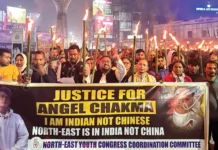Monday Musing
[Tongam Rina]
The families who lost their loved ones in Oting, Nagaland during the massacre by the Indian Army personnel in December 2021 cannot even hope for closure, as the Supreme Court has come to the rescue of the 21 Para Special Forces, citing the Armed Forces Special Powers Act (AFSPA), 1958.
The court order came after the wives of three personnel went to court, seeking the dismissal of criminal proceedings initiated by the Nagaland police against 30 Indian Army personnel responsible for the murders.
This Act empowers the Indian state and its personnel to face no consequences whatsoever for any crimes committed, including murder and rape, allowing for unimaginable violence in parts of Northeast India and Jammu & Kashmir.
“In view of the specific bar contained in Section 6 of the AFSPA, 1958, which provides that no prosecution, suit, or other legal proceedings can be instituted except with the previous sanction of the central government regarding the exercise of any power conferred under the said Act, the proceedings based on the impugned FIRs cannot continue any further,” the court order from 17 September reads.
“However, if sanction is granted at any stage under Section 6 of the AFSPA, 1958, the proceedings pursuant to the impugned FIRs may continue and may proceed in accordance with the law, ultimately leading to a logical conclusion.” The bench of Justices Vikram Nath and PB Varale also refused to give any direction on disciplinary proceedings as sought by the Nagaland government. “The concerned wing of the armed forces would be at liberty to take or not to take any disciplinary proceedings against its officers.”
On 4 December, 2021, personnel of the 21 Para unit massacred six villagers while they were returning back from a coal mine to Oting, in Mon district of Nagaland.
Seven more were killed when villagers retaliated, and one army personnel was also killed.
The police record states that the civilians were returning home from work when they were mistaken for insurgents and killed by the army personnel.
The spokesperson of the 3 Corps had stated that army personnel “planned a specific operation based on credible intelligence reports of likely movement of insurgents.” It is not uncommon for trigger-happy Indian forces deployed in the northeastern states to hide behind the claim of ‘credible intelligence input’ to justify civilian murders.
In any civilised nation, these soldiers would have been tried without the state government needing to go to court. The centre grant the necessary permission, but it did not do so despite requests from the Nagaland government. The Nagaland government had even filed a writ petition after being denied permission to pursue prosecution by the Centre. In July, the Supreme Court had given six weeks to respond to the petition seeking prosecution sanction.
This cycle of denial of permission by the Indian government to prosecute those responsible for the deaths of innocent civilians continued, resulting in the latest ruling that frees the army personnel from accountability and denies justice to the victims’ families.
The verdict was not entirely shocking, as the Act grants unprecedented power to the Indian army in the name of national security. Under the guise of national security, India has killed and maimed many in Manipur, Assam, Nagaland, and three districts of Arunachal Pradesh for decades.
Under the AFSPA, citizens are treated as suspects who deserve no respect or mercy. The Act has been used for unspeakable violence by the Indian state against its own citizens – from executions to rape.
The Act will continue, as the government has already extended it for a six-month period in April this year in Nagaland and Arunachal. In a notification issued in March, the union home ministry declared eight districts and 21 police stations in five other districts of Nagaland as ‘disturbed areas’ for six months, effective 1 April, 2024.
The central government has also declared Tirap, Changlang, and Longding districts in Arunachal, along with the areas under the jurisdiction of Namsai, Mahadevpur, and Chowkham police stations in Namsai district, bordering Assam, as ‘disturbed areas’.
While state governments can suggest whether the Act should be enforced, like Tripura and Meghalaya where the Act has been removed in 2015 and 2018, respectively, they are often not consulted, particularly the government of Arunachal, as Article 371(H) grants special provisions to the Centre. Under Section 3 of the Act, the Centre’s decision is final.
The disturbed area notification has been in force in Assam since 1990 and has been extended again by the state government, as well as in Manipur.
Nagaland has been under the draconian Act since 1958.
Every six months it’s reviewed. In most cases, every six months it’s extended for another six months. The cycle of repression and violence continues with extreme precision.
While there are many regressive laws, the AFSPA stands out because it is a law to suppress, inflict violence and fear, kill or maim, and control and colonize a section of India’s own citizens using Indian Army and other security personnel.
The responsibility is now on the politicians of the region to pressure the Indian state to repeal the AFSPA. The people of the region cannot be caged and killed under an Act in the name of national security.
Now is the right time for the state governments in the region and the central government to start negotiating on the issue. The Second Administrative Reforms Commission’s recommendations, as well as Justice Jeevan Reddy’s opinions, have already spelled the need to repeal the Act.
Simply passing resolutions when violence erupts to quell public anger is not enough.
For Oting, justice has reached a dead end for now, as it has in many other cases before it in Northeast India. There is little hope for closure.


